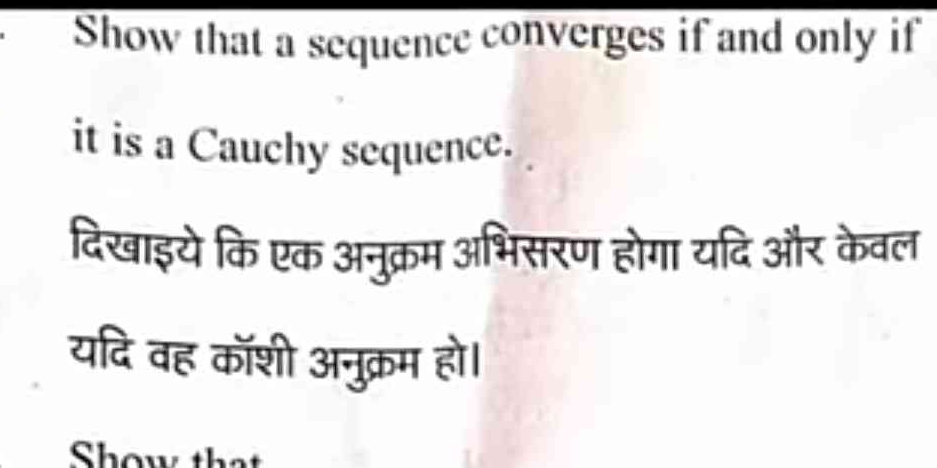Show that a sequence converges if and only if it is a Cauchy sequence.

Understand the Problem
The question is asking to demonstrate the equivalence between a sequence converging and it being a Cauchy sequence. This involves a proof that requires understanding the definitions and properties of convergence and Cauchy sequences in mathematical analysis.
Answer
A sequence converges if and only if it is a Cauchy sequence.
Answer for screen readers
A sequence converges if and only if it is a Cauchy sequence.
Steps to Solve
- Define Convergence and Cauchy Sequence
A sequence ${x_n}$ converges to a limit $L$ if for every $\epsilon > 0$, there exists a positive integer $N$ such that for all $n \geq N$, the terms of the sequence satisfy: $$ |x_n - L| < \epsilon $$
A sequence is called a Cauchy sequence if for every $\epsilon > 0$, there exists a positive integer $M$ such that for all $m, n \geq M$, the terms satisfy: $$ |x_n - x_m| < \epsilon $$
- Show Convergence Implies Cauchy Sequence
Assume ${x_n}$ converges to $L$. Given any $\epsilon > 0$, by the definition of convergence, choose $N$ such that for all $n \geq N$, we have: $$ |x_n - L| < \frac{\epsilon}{2} $$
Now for all $m, n \geq N$: [ |x_n - x_m| \leq |x_n - L| + |L - x_m| < \frac{\epsilon}{2} + \frac{\epsilon}{2} = \epsilon ] Thus, ${x_n}$ is a Cauchy sequence.
- Show Cauchy Sequence Implies Convergence
Now assume ${x_n}$ is a Cauchy sequence. We must show that it converges. Since the real numbers are complete, every Cauchy sequence converges to a limit $L$.
To show this explicitly, note that as $n$ increases, the distances between the terms $x_n$ become arbitrarily small. Therefore, we can find a limit point $L$ such that for any $\epsilon > 0$, there exists $M$ such that for all $m, n \geq M$: $$ |x_n - x_m| < \epsilon $$
Taking one of the terms, say $x_M$, we can show that $x_n$ converges to this limit $L$.
- Conclusion of the Proof
After establishing both directions:
- If ${x_n}$ converges to $L$, then it is a Cauchy sequence.
- If ${x_n}$ is a Cauchy sequence, then it converges to some limit $L$.
This proves that a sequence converges if and only if it is a Cauchy sequence.
A sequence converges if and only if it is a Cauchy sequence.
More Information
This equivalence is foundational in real analysis, establishing a critical property about sequences in complete metric spaces, like the real numbers.
Tips
- Misunderstanding Definitions: Confusing convergence with being a Cauchy sequence. Remember that convergence focuses on the limit of the sequence, while Cauchy sequences focus on the distances between terms.
- Assuming All Sequences Converge: Not all sequences are Cauchy in spaces that are not complete. It's essential to clarify the setting of the metric space.
AI-generated content may contain errors. Please verify critical information